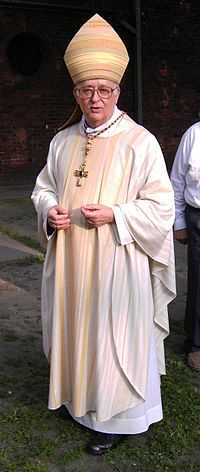Georg Sterzinsky
| His Eminence Georg Sterzinsky | |
|---|---|
| Cardinal Archbishop of Berlin | |
 | |
| Church | Roman Catholic |
| Archdiocese | Berlin |
| Installed | 9 September 1989 |
| Term ended | 24 February 2011 |
| Predecessor | Joachim Meisner |
| Successor | Rainer Woelki |
| Other posts | Cardinal-Priest of San Giuseppe all’Aurelio |
| Orders | |
| Ordination | 29 June 1960 |
| Consecration | 9 September 1989 |
| Created Cardinal |
28 June 1991 by John Paul II |
| Rank | Cardinal-Priest |
| Personal details | |
| Born |
February 9, 1936 Warlack East Prussia (Present day Poland) |
| Died |
June 30, 2011 (aged 75) Berlin Germany |
| Nationality | German |
| Coat of arms |
 |
| Styles of Georg Sterzinsky | |
|---|---|
 | |
| Reference style | His Eminence |
| Spoken style | Your Eminence |
| Informal style | Cardinal |
| See | Berlin (emeritus) |
Georg Maximilian Sterzinsky (9 February 1936 – 30 June 2011[1]) was a German cardinal of the Roman Catholic Church and the Cardinal Archbishop of Berlin.
Early life
Sterzinsky was born in Warlack (earlier also Wurlacken, Warlaucken, now Worławki, Olsztyn County), Landkreis Heilsberg, in German East Prussia. He lost his mother as a child and his family took refuge in Thuringia, due to the expulsions following the end of World War II; his homeland of Warmia is now within Poland.
Priest and bishop
Sterzinsky was ordained a priest in 1960. After serving as a parish priest for fifteen years, he became Vicar General to the Bishop of Erfurt in 1981. In 1989, he himself was appointed Bishop of Berlin and, in 1994, while remaining at the See of Berlin, he was promoted to the position of Archbishop of Berlin.
Cardinal
Sterzinsky was proclaimed Cardinal-Priest of S. Giuseppe all'Aurelio on 28 June 1991. He was one of the cardinal electors who participated in the 2005 papal conclave that selected Pope Benedict XVI.
Pope Benedict XVI accepted Cardinal Sterzinsky's retirement as Metropolitan Archbishop of the Roman Catholic Archdiocese of Berlin on 24 February 2011, for reasons of age (he had reached the age limit of 75, at which all bishops must write a letter to the Pope, offering to resign if the Pope wants).
No successor was immediately named for Cardinal Sterzinsky upon his retirement, so the Archdiocese of Berlin was a vacant see (sede vacante) at the time. On 2 July 2011, two days after the Cardinal's death, Pope Benedict XVI, named Rainer Maria Woelki as the new Metropolitan Archbishop of Berlin.
In April 2011 Cardinal Sterzinsky was transferred to a rehabilitation clinic. Since the Cardinal's resignation, Auxiliary Bishop Matthias Heinrich had been the apostolic administrator until the new Archbishop was named. In May 2011 it was reported that his condition was very serious after he developed pneumonia and had to be brought from the rehabilitation centre back to the hospital. Cardinal Sterzinsky died on 30 June. Pope Benedict XVI sent a telegram of condolence to Auxiliary Bishop Heinrich, expressing his closeness to the people of the Archdiocese and praising Sterzinsky's efforts in serving the people of Berlin during the fall of the Berlin Wall and the transition to a united Germany.
Views
In November 2004, Sterzinsky criticized the notion of "gay marriage". He argued in a sermon that it could be necessary for Catholics to protest and resist gay marriage laws "die dem Gesetz Gottes widersprechen" ("that are contradictory to the laws of God").
References
- ↑ "Berliner Erzbischof Sterzinsky gestorben". Berliner Morgenpost. Retrieved 2011-07-08.
External links
| Wikimedia Commons has media related to Georg Sterzinsky. |
- Bio from the Vatican
- Profile on Catholic Hierarchy
| Catholic Church titles | ||
|---|---|---|
| Preceded by Joachim Meisner 1988 |
 Bishop, then Archbishop of Berlin 1989–2011 |
Succeeded by Rainer Maria Woelki |
| Preceded by Joachim Wanke |
Chairman of the Berlin Conference of Catholic Bishops 1989–1990 |
Title extinct Members of Berlin Conference joined German Bishops' Conference |
|